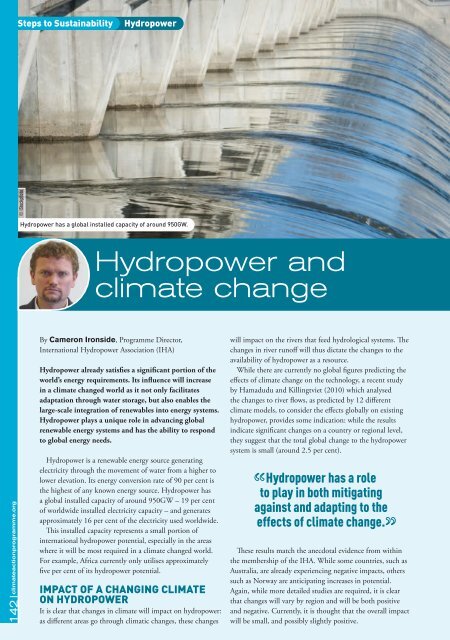Climate Action 2011-2012
Create successful ePaper yourself
Turn your PDF publications into a flip-book with our unique Google optimized e-Paper software.
Steps to Sustainability<br />
hydropower<br />
© iStockphoto<br />
Hydropower has a global installed capacity of around 950GW.<br />
Hydropower and<br />
climate change<br />
142 climateactionprogramme.org<br />
By Cameron Ironside, Programme Director,<br />
International Hydropower Association (IHA)<br />
Hydropower already satisfies a significant portion of the<br />
world’s energy requirements. Its influence will increase<br />
in a climate changed world as it not only facilitates<br />
adaptation through water storage, but also enables the<br />
large-scale integration of renewables into energy systems.<br />
Hydropower plays a unique role in advancing global<br />
renewable energy systems and has the ability to respond<br />
to global energy needs.<br />
Hydropower is a renewable energy source generating<br />
electricity through the movement of water from a higher to<br />
lower elevation. Its energy conversion rate of 90 per cent is<br />
the highest of any known energy source. Hydropower has<br />
a global installed capacity of around 950GW – 19 per cent<br />
of worldwide installed electricity capacity – and generates<br />
approximately 16 per cent of the electricity used worldwide.<br />
This installed capacity represents a small portion of<br />
international hydropower potential, especially in the areas<br />
where it will be most required in a climate changed world.<br />
For example, Africa currently only utilises approximately<br />
five per cent of its hydropower potential.<br />
Impact of a changIng clImate<br />
on hydropower<br />
It is clear that changes in climate will impact on hydropower:<br />
as different areas go through climatic changes, these changes<br />
will impact on the rivers that feed hydrological systems. The<br />
changes in river runoff will thus dictate the changes to the<br />
availability of hydropower as a resource.<br />
While there are currently no global figures predicting the<br />
effects of climate change on the technology, a recent study<br />
by Hamadudu and Killingtviet (2010) which analysed<br />
the changes to river flows, as predicted by 12 different<br />
climate models, to consider the effects globally on existing<br />
hydropower, provides some indication: while the results<br />
indicate significant changes on a country or regional level,<br />
they suggest that the total global change to the hydropower<br />
system is small (around 2.5 per cent).<br />
Hydropower has a role<br />
to play in both mitigating<br />
against and adapting to the<br />
effects of climate change.<br />
These results match the anecdotal evidence from within<br />
the membership of the IHA. While some countries, such as<br />
Australia, are already experiencing negative impacts, others<br />
such as Norway are anticipating increases in potential.<br />
Again, while more detailed studies are required, it is clear<br />
that changes will vary by region and will be both positive<br />
and negative. Currently, it is thought that the overall impact<br />
will be small, and possibly slightly positive.












